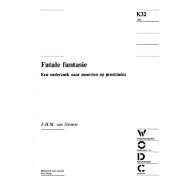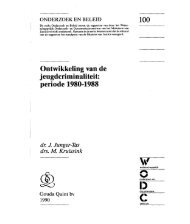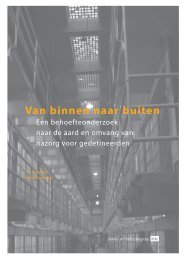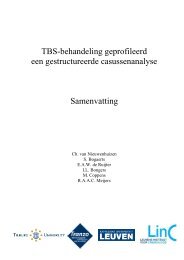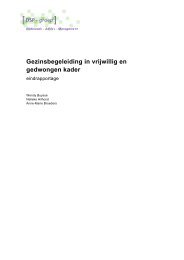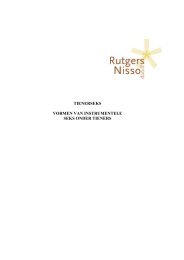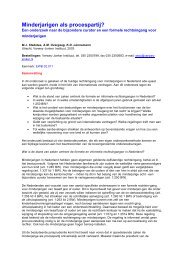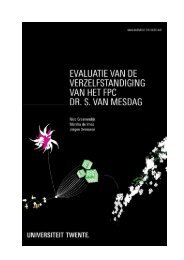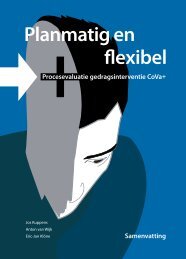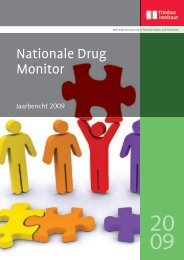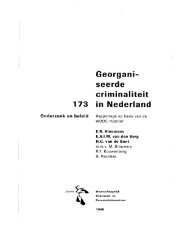3 01 Slachtofferhulp en herstelbemiddeling - WODC
3 01 Slachtofferhulp en herstelbemiddeling - WODC
3 01 Slachtofferhulp en herstelbemiddeling - WODC
You also want an ePaper? Increase the reach of your titles
YUMPU automatically turns print PDFs into web optimized ePapers that Google loves.
Summaries 150<br />
Mediation in relation to criminal procedure<br />
A.C. Spap<strong>en</strong>s<br />
The author gives a short overview of all the differ<strong>en</strong>t forms of mediation<br />
that are being applied before, during and after the criminal procedure<br />
in the Netherlands. The author differ<strong>en</strong>tiates betwe<strong>en</strong> three main forms<br />
of mediation: reparation of harm, settlem<strong>en</strong>t of conflict and mediation.<br />
Apart from the reparation of harm on the basis of the so called<br />
Aanwijzing Slachtofferzorg, these forms of mediation have not yet<br />
developed beyond the project stage. Settlem<strong>en</strong>t of conflict is mainly a<br />
matter of the police, especially in case of less serious criminal facts. A<br />
lot of facts that have not come to the att<strong>en</strong>tion of the police, can be<br />
appropriately treated in the context of neighbourhood mediation. In<br />
that way further escalation can be prev<strong>en</strong>ted. As to mediation,<br />
according to the author there are some risks. One of them is the aiming<br />
at a less severe punishm<strong>en</strong>t after a succesful mediation. Another<br />
question is whether the police can be a indep<strong>en</strong>d<strong>en</strong>t mediator. The<br />
author states that it is important to elaborate the preconditions of<br />
mediation more clearly. In his opinion a national, structured supply<br />
ought to be developed.<br />
Restorative justice or p<strong>en</strong>al law; duet or duel?<br />
L. Walgrave<br />
According to the author restorative justice has a social-ethical surplus<br />
value as compared to p<strong>en</strong>al law. He also states that p<strong>en</strong>al law is an<br />
inadequate means for the confirmation of social norms, while<br />
punishm<strong>en</strong>t has a stigmatizing influ<strong>en</strong>ce on the perpetrator. He also<br />
argues that willfully inflicting harm to others is ethically rejectable. In<br />
the concept of restorative justice it is not the punishm<strong>en</strong>t but the duty<br />
to repair damages that comes to the foreground; inflicting harm can be<br />
a secundary result of this duty. As to the applicability of restorative<br />
justice, comparisons to p<strong>en</strong>al law procedures show that victims who<br />
have be<strong>en</strong> in a mediation procedure are more satisfied about their<br />
opportunities to show their emotions, are more satisfied about the<br />
respect shown for their victimhood and the fairness of the appointm<strong>en</strong>ts<br />
made in the mediation procedure. Besides, the communicative<br />
aspect was more important than the offered material comp<strong>en</strong>sation.<br />
The author concludes that the option of restorative justice ought to<br />
have priority over p<strong>en</strong>al law options, although in many cases the aim of<br />
restoration remains secondary to the care for public safety.<br />
Family Group Confer<strong>en</strong>cing ; some critical remarks<br />
I. Weijers<br />
At the mom<strong>en</strong>t interesting experim<strong>en</strong>ts with restorative justice for<br />
juv<strong>en</strong>iles can be detected in many western countries. In this article the<br />
author criticizes the oft<strong>en</strong> too easily adopted idea that Family Group<br />
Confer<strong>en</strong>ces provide for the best pedagogical reaction to juv<strong>en</strong>ile



